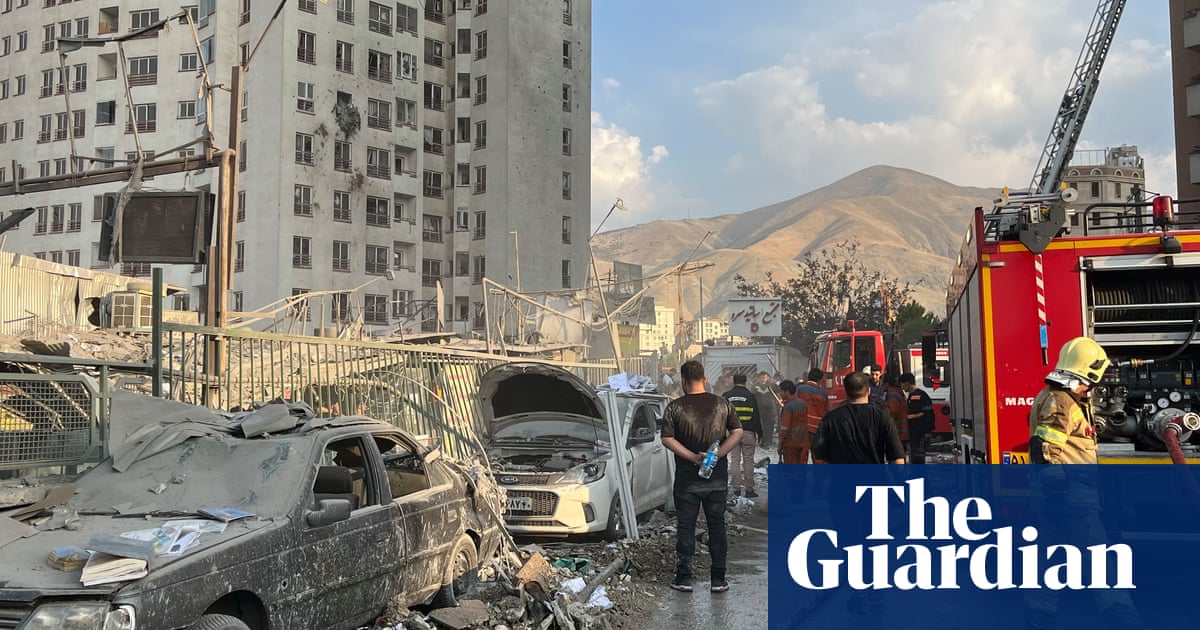Good morning.
Israel haslaunched an attack on Iranaimed at “dozens” of targets including its nuclear facilities, military commanders and scientists, claiming it took unilateral action because Tehran had begun to build nuclear warheads.
As Iran’s supreme leader, Ayatollah Ali Khamenei, threatened “severe punishment” against Israel, the Israeli military said on Friday morning that Iran had launched 100 drones aimed at Israel and that the country’s defences had been focussed on intercepting them.
Israel’s prime minister, Benjamin Netanyahu, said the Israeli attack, which it is calling Rising Lion, was aimed at “rolling back the Iranian threat to Israel’s very survival”, adding that it would take “many days”.
What has the US said about the move?TheUS moved quickly to distance itself from Netanyahu’s decisionto target Tehran in an escalation that threatens an all-out war in the Middle East. The unilateral strikes indicated a collapse of Donald Trump’s efforts to restrain the Israeli prime minister.
Follow our live coverage here.
An appeals court hastemporarily returned control of California’s national guard to Trump, hours after a federal judge ruled the president’s use of the guard to suppress protests in Los Angeles was illegal and banned it.
The 9th US Circuit court of appeals order means Trump retains command of the guard for now and can continue to use personnel to respond to protests against his immigration crackdown. The court could later decide against his control.
It’s a temporary victory for Trump in back-and-forth court decisions on who should control the security force, an issue that has pitted California’s governor, Gavin Newsom, against the president, and angered Democrats, who see the deployment as an abuse of power.
What’s happened toAlex Padilla?The Democratic California senator, wasforcibly removed and handcuffedas he attempted to ask a question at a press conference held by Kristi Noem, the homeland security secretary, in Los Angeles yesterday.
Rescue teams withsniffer dogs were combing the crash site of a London-bound passenger jetthat ploughed into a residential area of Ahmedabad in India, killing at least 265 people onboard and on the ground.
One man on the Air India Boeing 787-8 Dreamliner – carrying 242 passengers and crew –survived Thursday’s crash, which left the tailpiece of the aircraft jutting out of the second floor of a hostel for medical staff from a nearby hospital.
Kanan Desai, the deputy commissioner of police, said 265 bodies had so far been counted, including people who died on the ground, but the toll may rise as more body parts are recovered.
One of two black boxes had been found, the Hindustan Times reported.
Who was the sole survivor?A British man, Vishwash Kumar Ramesh, who was in seat 11A of the flight, survived the crash. He said: “I have no idea how I exited the plane.”
What caused the crash?A full investigation will be necessary but aviation experts say arange of potential factors could have been at play, from bird strike to sabotage.
Follow our live coverage here
Trump has ordered the US government to consolidate its wildland firefighting force into a singleprogram, despite warnings from former federal officials that itcould be costly and increase the risk of catastrophic blazes.
A Roman Catholic priest who admitted to child molestation has publicly recounted for the first time how New Orleans’ archbishoptried to give him a second chanceto continue his career.
A judge released a Russian-born scientist and Harvard University researcher charged with smuggling frog embryos into the USyesterday,freeing her on bail after a brief hearing.
During a congressional hearing yesterday,the USdefensesecretary, Pete Hegseth, appeared to acknowledge that the Pentagon hadcontingency plans to take Greenland and Panama by forceif necessary.
The House voted narrowly yesterday tocut about $9.4bn in spendingalready approved by Congress. The package targets foreign aid programs and the Corporation for Public Broadcasting, which provides money for National Public Radio and the Public Broadcasting Service, as well as thousands of public radio and television stations around the country.
Credit card debt has ballooned to more than $1tn in the US over the last several years, and consumer advocates are worried that the debt burden is even worse with thegrowth of buy-now, pay-later(BNPL). In recent months, companies such as Klarna and Affirm have been partnering with companies such as Walmart and eBay so that nearly every purchase can be made using BNPL.
The Brazilian government is preparing to stage anoil exploration auction, months before it hosts the Cop30UN climate summit, despite opposition from environmental campaigners and Indigenous communities. The “doomsday auction”, as campaigners have called it, includes 47 blocks in the Amazon basin.
Prairie dogs bark to alert each other to the presence of predators, with different cries depending on whether the threat is airborne or approaching by land. And according to new research,curlews have figured out that if they eavesdrop on these alarms, they may get a jump on predators coming for them, too.
First Thing is delivered to thousands of inboxes every weekday. If you’re not already signed up,subscribe now.
If you have any questions or comments about any of our newsletters please emailnewsletters@theguardian.com
